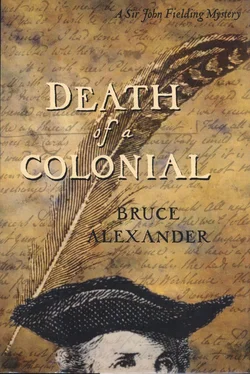Bruce Alexander - Death of a Colonial
Здесь есть возможность читать онлайн «Bruce Alexander - Death of a Colonial» весь текст электронной книги совершенно бесплатно (целиком полную версию без сокращений). В некоторых случаях можно слушать аудио, скачать через торрент в формате fb2 и присутствует краткое содержание. Год выпуска: 1999, ISBN: 1999, Издательство: Putnam Adult, Жанр: Исторический детектив, на английском языке. Описание произведения, (предисловие) а так же отзывы посетителей доступны на портале библиотеки ЛибКат.
- Название:Death of a Colonial
- Автор:
- Издательство:Putnam Adult
- Жанр:
- Год:1999
- ISBN:9780425177020
- Рейтинг книги:3 / 5. Голосов: 1
-
Избранное:Добавить в избранное
- Отзывы:
-
Ваша оценка:
- 60
- 1
- 2
- 3
- 4
- 5
Death of a Colonial: краткое содержание, описание и аннотация
Предлагаем к чтению аннотацию, описание, краткое содержание или предисловие (зависит от того, что написал сам автор книги «Death of a Colonial»). Если вы не нашли необходимую информацию о книге — напишите в комментариях, мы постараемся отыскать её.
Death of a Colonial — читать онлайн бесплатно полную книгу (весь текст) целиком
Ниже представлен текст книги, разбитый по страницам. Система сохранения места последней прочитанной страницы, позволяет с удобством читать онлайн бесплатно книгу «Death of a Colonial», без необходимости каждый раз заново искать на чём Вы остановились. Поставьте закладку, и сможете в любой момент перейти на страницу, на которой закончили чтение.
Интервал:
Закладка:
“He seemed to account for everything, didn’t he?” said Mr. Daliymple. “I perceived no gaps in his story, and no hesitation in his telling of it.”
“Did you see the tears in his eyes when he spoke of his mother?’ said William Mansfield, the Lord Chief Justice of the King’s Bench. “I should not like to see him before a jury. He would likely have them weeping along with him.”
Then did he turn to the Solicitor-General. “Sir Patrick/‘ said he, “do you have an opinion in this matter?”
To which Sir Patrick Spenser did shake his head in the negative. And with a wave of his hand, he indicated that the matter should not involve him, that it was entirely the affair of the commission. I recall reflecting at that moment how eloquently he managed to express himself by mere signs and gestures.
Silence once again. It was broken by Mr. Trezavant, who did no more than give expression to a thought which had occurred to others. “Could it be,” said he, “that this fellow is telling no more than the truth? Perhaps he is who he says he is — Lawrence Paltrow, the true and legitimate heir to the Laningham title and fortune. You will surely admit that he is most convincing.”
There were grunts of assent about the room.
But of a sudden Sir John Fielding leapt from his chair. “No, by God, no! ” He wailed it forth, a strangled cry of frustration. “He is not Lawrence Paltrow. In the beginning, I might well have conceded the matter of his identity quite indifferently, but the closer I have got to him and the more I have learned of him and those about him, the more certain I am that he is an impostor.”
“Yet, Sir John,” said Mr. Trezavant, ‘you must know I put that forward only with the greatest reluctance. My inclination is to find against him, but how can one do that when his every word and his every emotion seem to argue in his favor?”
“I can only insist that no matter how convincing he is, no matter how pleasing his manner, he is not who he claims to be. And perhaps that will be revealed now with — ” Sir John broke off in midsentence; his more sensitive ears had picked up the sound of the claimants returning footsteps. “Soft, now,” said he, “the fellow comes.” And so saying, he seated himself once again and put upon his face that same impenetrable blind mask that he often hid behind; it took but a moment, and he appeared as one asleep.
The claimant reentered the room and nodded solemnly about him. He resumed his place, looking left and right, and said simply, “I am ready.”
“I believe,” said the Lord Chief Justice, “that the gentleman who entered with Sir John now has some questions.” He looked hopefully in the direction of Mr. Inskip. “I do not know his name, so I cannot properly introduce him to you, Sir?”
The Mr. Inskip who came forward was hardly recognizable to me as the frail old gentleman who had come off the Oxford coach. Where that one moved with a halting step, this one walked with a bounce; where one seemed timid and fearful, the other was confident beyond measure; the former spoke in a high, fluting tenor, while the present Mr. Inskip’s voice seemed mysteriously to have deepened.
“It is of no matter that you do not know my name,” said he, addressing the group, “but you, sir “ — turning to the claimant — ‘you should certainly know me. Who am I?”
The claimant, taken aback, could for a moment do naught but stare at this curious old man who had assaulted him so rudely. But then, after a bit of silent sputtering, he did manage to say: “Why. . why, I am not sure. Ought I to know you?”
“Oh, indeed you should. You and I met often — at least once a week for three years.”
“Was it in the colonies? You must forgive me, but I have a lamentably poor memory for faces.”
“Well, it was not always so. I can recall that a time there was when you would draw my face from memory and put it on a goat’s body. What was it you wished to imply by that, eh?”
“I don’t know that I wished to imply anything, sir.”
The claimant had grown tense, his mood altogether altered in not much more than a minute. His audience, by contrast, had relaxed so considerably that two or three of the commission were now chuckling at his discomfiture.
“Not know what you wished to imply?” questioned Mr. Inskip. “I doubt that. Indeed, I doubt you completely, sir. You say that you are Lawrence Paltrow? Well, I say you are not. You must convince me. “
“I believe I can,” said the claimant. “I have well over a hundred statements and affidavits which I can — ”
“Which you can what?”
The claimant sat, staring up at Mr. Inskip, his persecutor. His frustration and curiosity were plain upon his face. At last, he managed to form the question that now consumed him quite completely. “Sir, tell me, please — who are you?”
“I’ll give you my name. It is Richard Inskip. Does that mean anything to you?”
The claimant closed his eyes and fixed his face in concentration. “You were … let me see. . you were the tutor. At Oxford.”
“Ah, so you do remember the name, no doubt from some list that was passed on to you. During your recent visit to the university, you looked in on Professor Fowler and Professor Newcroft, but you failed to come to me. And so, given this opportunity, I took it eagerly that I might myself ask you the sort of questions that anyone who claims to be Lawrence Paltrow could certainly answer.”
“I … well, it was not my intent to slight you, sir,” spoke the claimant.
“Oh, pish-posh,” Mr. Inskip replied. “To be quite frank with you, young man, I do have a good memory for faces. I can recall that of Lawrence Paltrow quite well, and yours is not his. I concede that there is a resemblance, one perhaps of a brother but not of a twin. Nevertheless, if you can answer my questions, I shall put all that aside and accept that you are who you say you are. And I shall advise these gentlemen to accept you, too.” With that, the tutor gave him a flashing grin. “Shall we begin?” said he.
“Uh. . well … I suppose.”
At this point, reader, I fear I must apologize and offer an explanation of some sort. It has been my experience in writing these accounts and descriptions of certain of the cases of Sir John Fielding that it was only those matters which I myself understood that I have been able to render satisfactorily on the page. Even in medical matters which were not always entirely clear to me, I was able to consult with Gabriel Donnelly, physician and surgeon, that I might not err in their presentation. However, of what I heard from Mr. Richard Inskip during the time that followed, I understood very little (nothing, would be more accurate) and in preparing this narrative, I had none with whom I might consult and no one to question. So it is, reader, that I can give no true account of the questions put to the claimant by Mr. Inskip, for they dwelt upon matters of natural history and natural science which were simply incomprehensible to me. There were references to Sir Isaac Newton, of whom I had some knowledge, and Robert Boyle, of whom I had none. There was talk of a most peculiar table, one of ‘elements’ as it were. Yet more: ‘Pliny!’ ‘igneous phenomena’, ‘aqueous’, ‘anthricitis’, ‘hydro-phane’. On and on these strange terms, and many more such, passed from one to the other. There was a separate category of questions occasioned by the word (or name) ‘Linnaeus’, and this included ‘mammalia’, ‘molluscs’, ‘hydroids’, and such.
That last term, as I recall, occasioned this exchange between Mr. Inskip and the claimant:
Inskip: “Come now, sir. Hydroids? Surely that should be quite evident. Or have you forgotten all your Greek?”
Читать дальшеИнтервал:
Закладка:
Похожие книги на «Death of a Colonial»
Представляем Вашему вниманию похожие книги на «Death of a Colonial» списком для выбора. Мы отобрали схожую по названию и смыслу литературу в надежде предоставить читателям больше вариантов отыскать новые, интересные, ещё непрочитанные произведения.
Обсуждение, отзывы о книге «Death of a Colonial» и просто собственные мнения читателей. Оставьте ваши комментарии, напишите, что Вы думаете о произведении, его смысле или главных героях. Укажите что конкретно понравилось, а что нет, и почему Вы так считаете.












